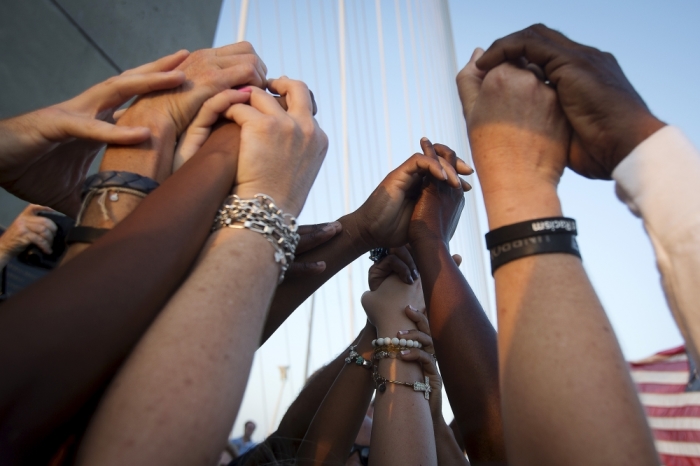Bible experts discuss racial divide in US, how Christians can be part of solution

Bishop Derek Grier of Grace Church in Dumfries, Virginia, recently held a series of discussions with a variety of Bible experts regarding racial strife United States and how Christians can be part of the solution.
Among those interviewed by Grier, the founder of 50 ministries, was Courtney McBath, the president of Virginia Bible College and bishop of Calvary Revival Church in Norfolk, Virginia.
When asked why people might be unaware of the multiculturalism in the Bible, McBath said he finds that it's due to an educational problem.
“Like everything else, it’s a lack of teaching and training, and it’s the context and perspective of the training that we have. Part of the struggle of today is that so much of the Gospel was introduced to the world by a segment of people,” said McBath, who's served as a pastor for more than 30 years and is the head of a multicultural leadership network on five continents.
“When people go somewhere to introduce the Gospel, they tend to take not only the Gospel but their culture. All of us tend to make the Bible or whoever our heroes are look like us,” McBath added.
The pastor said he believes that God purposely placed the Middle East in the center of the world to help the Gospel go forth.
“I think God did set it up geographically where you had to go through this place to get anywhere else, and it takes someone with an apostolic flair like Paul to be put in the middle to get to other places,” he said. “It’s as if God intentionally made sure that this Kingdom message would go everywhere and not be limited to any one particular culture.”
McBath encouraged minorities impacted by racism to speak up about their experience, adding: “I would never say to the Jewish people, ‘Hey, now let’s just stop talking about the Holocaust. I mean it happened, people died, but they paid you well afterward. Let’s move on.' That would be so insensitive, so unfair to ask people to forget the level of suffering they endured and to pretend that it has no impact on them today."
Christians should be empathetic, feel the pain of others and help those suffering to get through their pain, he emphasized.
“That’s Jesus' work in my life — to be empathetic toward my suffering and bring me out of it,” the pastor contended. “So, I think when we do that for our brothers and sisters in any minority or in the majority — if they’re hurting — when we do that, we simply represent Christ in us.”
“Jesus never says, ‘Hey, just forget that you were wronged. Get over it; we’re moving on.’ He doesn’t do that and we shouldn’t either,” McBath concluded.
Bishop Grier also interviewed Samuel Rodriguez, the pastor of New Season Christian Worship Center and president of the National Hispanic Christian Leadership Conference.
In order for minority-led churches to begin to become more culturally plural, Rodriguez said it's important to extract the idea of minority-led churches and have "diversity in the leadership within the Church."
“Horizontally speaking, we can’t deny the fact that there are majority groups and minority groups," he said. "However, vertically, there’s no such word as 'minority' in the Bible. Because [when] I am Kingdom driven, I look at church planting initiatives, or even churches, not from a minority point of view, but from a Kingdom point of view,” said Rodriguez.
The pastor explained that his own church leadership intentionally reflects the diversity of its congregation.
“We are very intentional about making sure we reflect what we want to see,” he posited.
“Do I deliberately make certain that I have a person of Asian descent on our team? Yes. You want to call it affirmative action. Call it whatever you want. I am certain that we have African Americans, Latino, whites — we are to be advancing the Kingdom of Heaven here on Earth. The Church must be a composite of what we want to see in Revelations,” Rodriguez added.
Rodriguez said he believes that multi-ethnic churches will be the antidote to some of the racial discord seen in the U.S., adding: "The culture of the Kingdom of God trumps any culture.”
Sam Chand, the CEO of Dream Releasers, also shared his take on the racial tensions in America. Chand was born and raised in India and immigrated to the U.S. at age 20.
“Where I grew up, it was caste system as well as geography," he said. "In some countries in Africa, it is tribe and color. In some parts of Europe, it is Catholic and Protestant. In the Middle East, it is different sects of Muslims. … But the divide in 1973 was much clearer,” Chand recounted. “There was very little integration of churches. There were hardly any churches where you could say that blacks attended a white church, or whites attended a black church.”
The bestselling author said the global Church is more nuanced and thus creates "missed opportunities" and "misunderstandings." Based on his experiences over the years, Chand stressed that relationships are "built on similarities and dissimilarities and even differences."




























